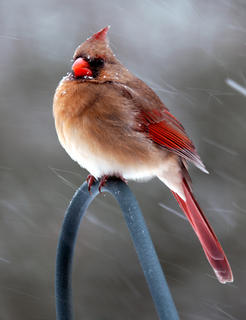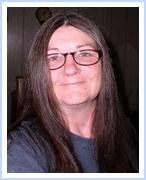
Looking out the window, a cold grey mist raises off the mountain this morning. Memory ghosts hang on my shoulders, the coffee cup is warm, the dogs are sleeping and my hearts joy is alive. Closing my eyes I can see the falling snow of the cottonwood trees along the river. The pungent smell of weeds and railroad ties shimmers unseen. My brother hop-scotches between the rails, his head down, the sun at his back, little boy talking to me as I put one foot in front of the other and walk on greased steel. Insects humming, small birds dart through the blackberry briers down along the elevated railroad bed. Berrys as big as thumbs, the sweetest always out of reach, we mark the spot and plan, next time bring our buckets and hook-cane poles.
Momma got a job that week at the cannery, pitten peaches. Sticky thick apron, her hair snooded and those round white pins with the horses heads attached to her blouse collar. Her eyes drained of energy, to tired even to read to us before bed. Dad worked a few days making sure labels got glued to cans going down miles of conveyor belts. He preferred to drink from a gallon jug of sweet wine under the cottonwood trees with his friends; someone had to stay home and watch us kids, get us off to school and all.
I ask him, "Why do we have to go to school, the kids that live in the ambulance don't have to?" He said, "You don't want to live in a tent and sleep in an ambulance do you?" At the time I thought the ambulance was bigger than our teardrop trailer; we hooked school anyway. Living on the wrong-side of the levee in a trailer court can leave a whole lot of emotional debris that hang like plastic bags high in the tree tops. When the river floods, trailer trash packup and head for high ground, fast. The ambulance family didn't have any tires on their home. Kids at school didn't even know there were some worse off than David and me. Name calling on the play ground of life, my fists were bloody. School was teaching big boys never to push my little brother, some learned faster than others. It was peaceful walking the railroad tracks, school was for people who lived in houses.
David pointed to something bright down the tracks. "It's just the sun shinning on a tin can or something." I told him.We meandered towards the trussle-bridge chucking rocks, the birds kept their distance. Judy, our welsh corgi took off barking. I always made her stay close, so I could pick her up fast, in case a train might come along. She scooted down the loose gravel toward the river, and stood barking at some old cloths a hobo probably tossed off a slow moving boxcar. We hurried to catch-up with her, she was having a fit, making all kinds of noise. As we ran closer, I reached out and grabbed a handful of David's shirt bringing him to a full stop, he squirmed and squawked, but I held him tight. Judy ran back and forth barking her head off. That pile of cloths was occupied... with a yellow handled knife in its back. The sun reflected off the silver pommel as if it were magic. It was so bazaar, we were frozen in fear, and yet that dagger was beautiful. "Deads is dead." I said, "Go get me that knife." David took a step forward and I pulled him back, still having hold of his shirt. There is something about right and wrong, good or bad, when to stay and when to leave. Like my daddy would say, "When a little bird whispers in your ear, listen." I was and I did, somethings things are best left alone.
I could feel David vibrating through his shirt and Judy was shaking against my leg; it was time to turn and go.
We ran back to the trailer court. Out of breath, I tried to tell daddy and his friends what we had seen. The gallon jug was almost empty, it was hopeless. "Can't you see I'm talking? Go on now, go play. You can tell your mother when she gets off work." David pulled on my sleeve, "We can tell Marie".
Marie owned the trailer park and lived in a pink trailer with a white pickett fence around it. She was short and plump, had curly white hair and one eye that looked up all the time. Her English was hard to understand. She cussed at us for following the ice truck as it made its deliverers through the trailer court. Guess she thought we were going to steal, like the other kids did.
We ran to her," almost a house". Again out of breath but on a mission, my fist felt like a sledgehammer against her pink metal door. The mid morning breeze sent cottonwood seedpods flying to cover everything in white. Bam! Bam! Bam! "Go to hella away, you come backa later" she growled. I knocked softer. She opened the door, her bloodshot eyes stared at us, at least one of them did. She groped at closing her grubby housecoat as I told her what we had seen. "Ifa you a lieing, I killa you both." Standing on her step waving away cottonwood down, we could hear her tell the police to, "comma quick". They did, we could hear the trailed doors closing as everyone outside went inside. A police siren sent everyone for cover to peek out their dirty curtain windows. Two black and whites pulled to a stop in front of the white pickett fence. Marie had changed into a dress, her car keys in hand. She leaned her head in the passenger side of the police car, then stood up pointing toward the railroad tracks that ran on another levee by the river. The dirt had hardly settled as the two police spun a billowing cloud of dust sending seedpod fluff rolling in sprawls. We hopped on Marie's running board and followed in hot pursuit. Her faded gray Dodge sucked in air instead of gas, cough and bucked like the old men who sat smoking on their trailed steps in the early morning hours.
One arm around David and the other held tightly to the Marie's open window jam, my feet planted firmly to the running board. David looked up, his blond hair I can almost smell now, his blue eyes alive with excitement, a grin wider than the river. "Do you think they'll give us the knife?"

1 comment:
Such a long time ago and yet it seems like only yesterday.
Post a Comment